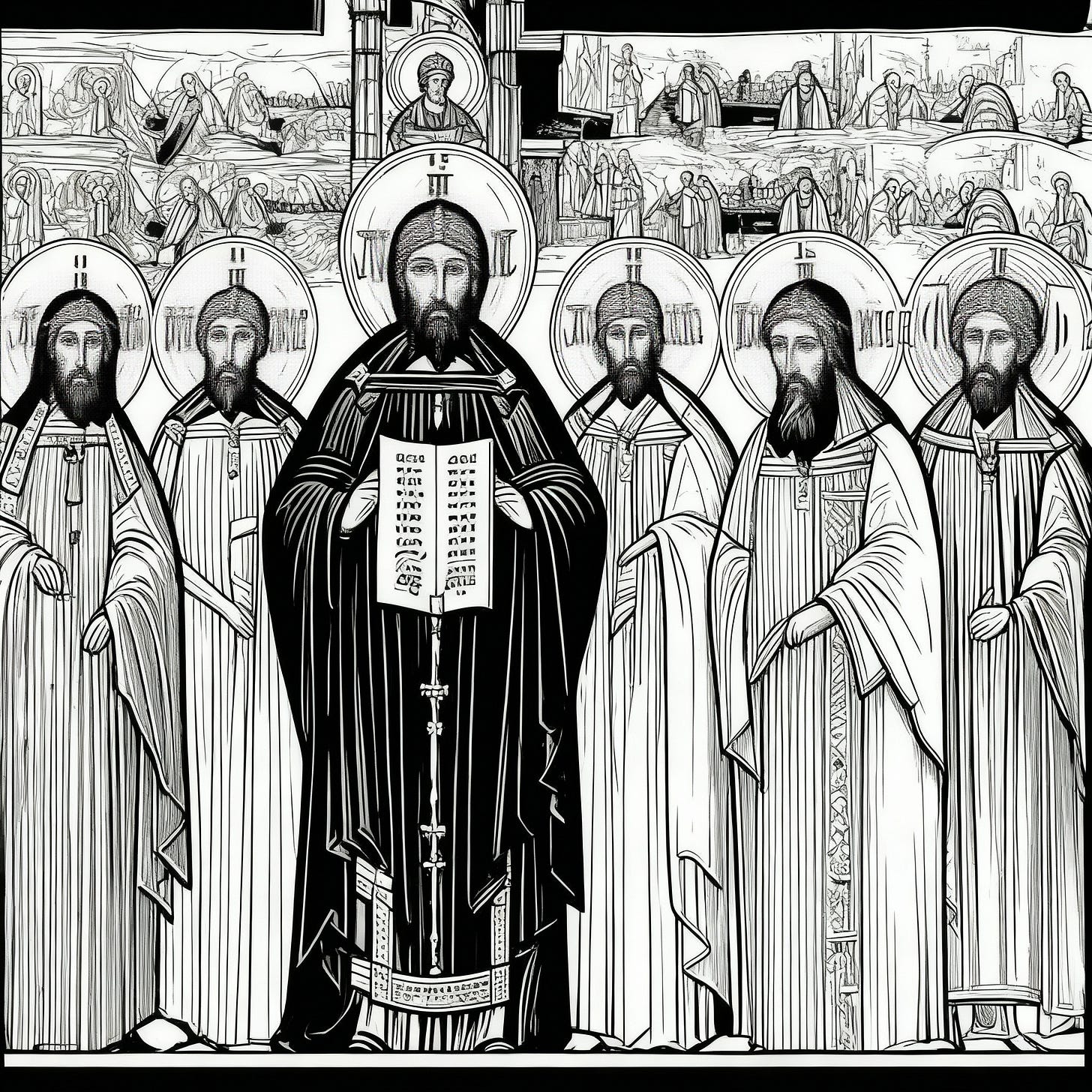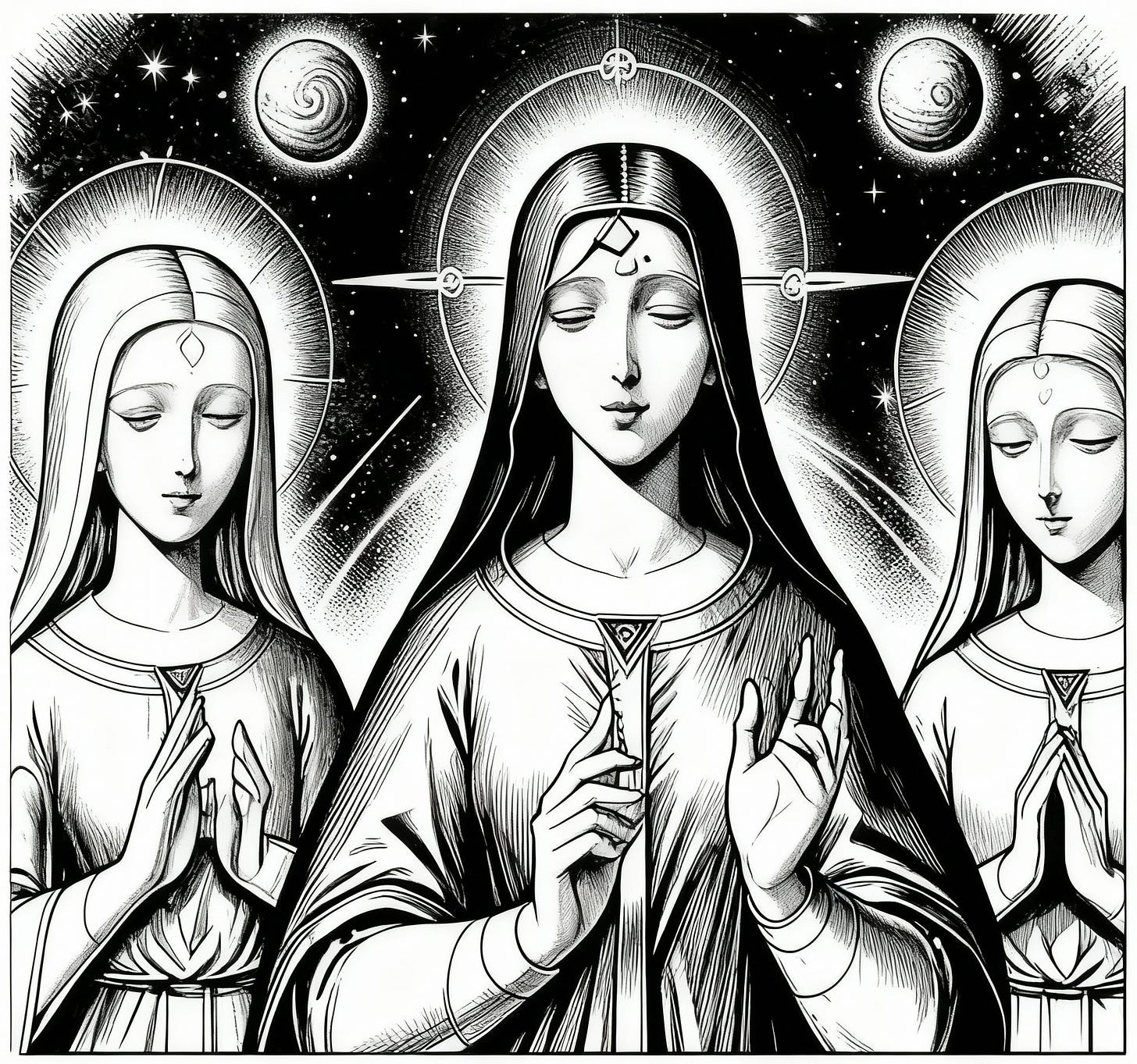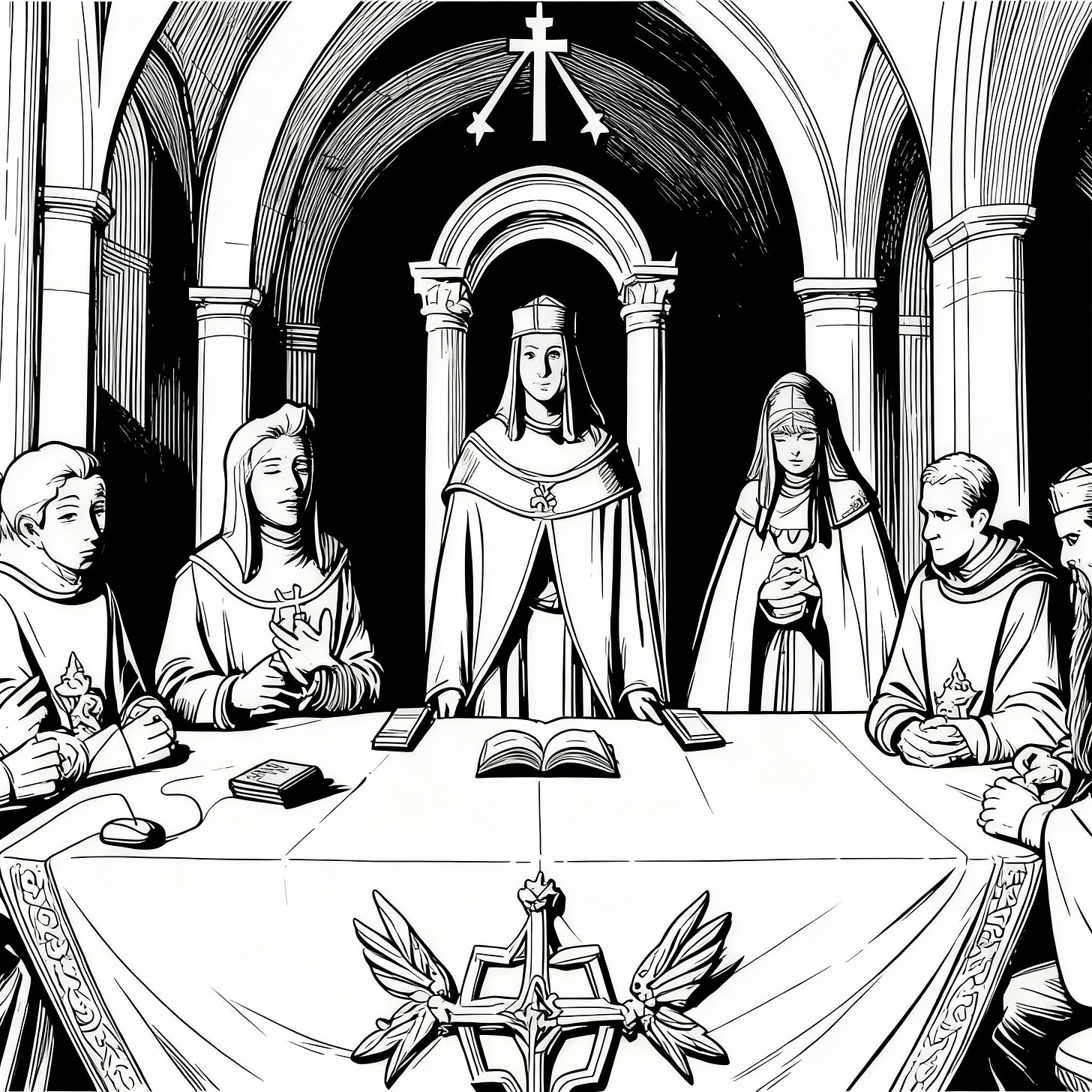How to Build a Religion
According to a beginner.
Apparently Christmastime is a season for orthodoxy for me. This time last year, I was reading Deep Church Rising: Recovering the Roots of Christian Orthodoxy, by Andrew Walker which, as its title suggests, argues that the Church must revive itself by returning to its original traditions — which got me thinking about the idea of intersubjective cohesion, or the way truth can be more sort of crowdsourced; and of the importance of discernment.
This year, it’s Gethsemane: The Origins and Rise of the Intellectual Revolution in the Church, by Italian cardinal Guiseppe Siri, which talks about the resurgence of heretical ideas in the Christian world, and seeks to establish why the doctrine of the Catholic Church continues to be correct — which, again, gets one thinking about the essence of Christianity, the nature of doctrine, and what could possibly replace it. (All of which, to be fair, are things that I think about all the time.)
Just to be clear from the start: I don’t generally subscribe to the idea of doctrine. I think something profound happened in Palestine two thousand years ago, but I think it’s very hard to say for sure what it was. If I had to make definite statements right now, once and for all, I’d say that there are things that the Catholic Church holds as authoritatively true that just cannot be said, by an epistemologically rigorous person, to be authoritatively true. I’d go further and say that the rigidity and dubious epistemology of the doctrine, and the hierarchy spawned around it is, more than anything, what’s threatening the life of the Church. I’d harken to a great quote that I recently found, sans context, by Rabbi Hugo Gyn, via Facebook: "Spirituality is like a bird: hold it too tightly and it chokes; hold it too loosely and it flies away." It seems to me that the Catholic Church is holding the bird too tightly — even while it not at all unreasonably suggests that the modern secular world is holding it too loosely.
From the outset, too, I have to say that I don’t always feel good about my critique of the Church. Cardinal Siri observes that the agency of the Church is something that sometimes exceeds human understanding, and I think that’s true. In non-denominational spiritual circles it’s sometimes said that “the second coming is a sangha,” and I think that some of this applies: that I can see, the aggregate activity of the Church is flawed and messy, but it is also indeed a sort of crowdsourced incarnation of Christ — albeit one with a well-defined administrative hierarchy and, perhaps, one with some dust in its mechanisms. But to me it is also, undoubtedly, a sacred formation.
Further, while its ideological broad strokes are so easily understood that pretty much everyone has some opinion about them, the underlying ideological architecture of the Church is actually pretty deep and complex, and I know that I am only beginning to understand it. My critique is novice and imprecise.
Anyway, while I’m doing all this thinking, I am prepping a very small, short, four-session course on Christian mystics at the gracious and exciting invitation of the small lefty non-denominational church of which I’m a member. So I’ve been diving into the lives and thought of Ignatius of Loyola, Evagrius of Pontus, and, especially the past few days, Teresa of Avila and Catherine of Siena.
This is a world that makes sense to me. Daily, devout, self-abdicating personal work of transformation makes sense to me. A fierce attempt at continual dialogue with the Divine makes sense to me — including, and in some ways especially, within the context of the Gospel narrative. To me, this is a radiant path, and it seems to me that the core engine of the Church drifts from this center when it emphasizes orthodoxy and doctrine over this process — and over these radiant exemplars, these saints. To me, doctrinal Catholic theology is tantalizing, and not entirely invalid, but it’s gummed. Teresa and Catherine, meanwhile, are limpid.
You cannot cleanly separate Christian mysticism from Christian monasticism. And monasticism has repeatedly saved if not the life of the Church than surely its soul. When you juxtapose doctrine against mysticism, it seems to me that you have to see that true Christianity is just not a set of answers so much as it is a line of inquiry. It is not a recipe. It is always, intrinsically, a process.
Lots of people would agree with that, obviously. Also, lots of people don’t seem to realize that it’s possible to go off the other side of the table. If you hold the bird too loosely, it does indeed fly away. And not everybody seems to know it.
To make the point, I’d go back to Cardinal Siri. I’m only about thirty pages into this book, but in the introduction he says that the world at large is getting off course in three main ways: It’s reviving the Pelagian heresy, he says, by which people believe that they can rely on, and save themselves without the intercession of grace. It’s reviving the good ol’ Arian heresy, he says (I added the “good ol’,” by the way), which reduces the Christ to a creation, rather than holding Jesus to be the pure incarnation of God. And, lastly, it’s asserting a core “modernist” tendency toward relativism and agnosticism which especially, he says, undermines the idea of revelation by treating it first and foremost as a psychological phenomenon.
I don’t know who will read this post, but I know a lot of people who would hear Cardinal Guiseppi Siri’s complaints and essentially say, in response, “No, you get off my lawn, Cardinal Guiseppi Siri!” To many people, Siri’s bristling about violations of orthodoxy sounds outdated and imperious. The very notion of heresy sounds silly. But for modern secular or non-denominationally spiritual people, I think it’s important to consider that the Church simply cannot be dismissed from the conversation, as I think Cardinal Siri’s ideas above indicate, and which I’ll try to explain.
First, for instance, the Church is one of the primary agents in the world that tries to understand, and remind the rest of us, about grace. And it’s pretty clear to me that grace is real. There is just no doubt to me that something beyond us can work both within us and around us to help mend the broken parts of us and to make us more refined. When people feel separated from the experience of grace, it’s important not to tile over those experiences with glib — and, I think, inevitably ignorant — statements. But when Teresa of Avila wishes that the most troubled person might only spend two hours a day with God, thereby to be utterly and irreversibly transformed, it’s clear to me that she is talking about a mechanism that, at very least, exists.
For Cardinal Siri, and the Church, it’s hard to separate the idea of grace from the idea of sin, and that seems to be an important distinction to me, too. I know that my access to deeper levels of grace has definitely required me to surrender to the idea that I commit what could be called sin. To be clear, nobody gave these ideas to me as part of a Christian party line that I was obliged to swallow. I arrived there on my own. The exploration of the concept of sin is complicated — everything that I’d mention in this post is complicated, and I’m trying to give some attention to the complexity. Again, hold the bird too tightly, and it chokes; too loosely, and it flies away. But, also, it seems to me that the Church helps keep open doors of inquiry that might otherwise close, including about the idea of sin.
To Cardinal Siri, there’s also something off about trying to do everything under one’s own power; and I see that that’s essentially true also. I tend to think the apparently innocuous choice of living according to self will is currently doing tremendous damage in the world. To me, a healthy approach keeps grace, and sin, and surrender of self-will all squarely on the table; and to me, to toss any of of them, asserting the entire supremacy of personal agency, or abolishing the idea of transgression altogether — even in the name of being charitable to us, we imperfect humans — is to fall off the other edge of things. It’s worth seeing how grace, sin, and surrender are all of a piece, and it’s worth seeing the ways that their antitheses are all of a piece, too.
I even think it’s worthwhile to go where Cardinal Siri’s leading with his complaints about the Arian debate. Not all the way, perhaps, but at least some of the way. In the third century, an Alexandrian presbyter named Arius argued that Jesus, the Christ, was a creation of God, and not the co-eternal incarnation of God. The fight over doctrine that ensued resulted in the first famous ecumenical council at Nicea, which reinforced the definition of an official Church creed, and then the debate continued to ripple and echo over the course of centuries.
The idea that folks would get in a tangle over whether Jesus was almost exactly God or exactly God seems ridiculous to a lot of people today. Most people I know, including virtually all of my Catholic relatives, would go way farther than that. Most of my Catholic relatives have passed through the very large door at the back of the Catholic Church into either agnosticism or atheism, and they will gently, kindly admit that they think Jesus was a great person, but that they do not at all believe that he was the Son of God. Many of them don’t believe in God at all anymore. And much of the secular and spiritual world would agree, at least, that the “Jesus the great man” hypothesis is the most realistic place to begin.
I wouldn’t say that an invalid place to begin, but to me, to entertain thoughts only from this quarter misses Cardinal Siri’s contribution. Which is to say, it misses one of the most compelling investigations there can be. If you believe in God, it’s hard to imagine something more compelling than the thought of how God actually intersects with humanity. Many spiritual people I know would at least say that Jesus was an enlightened teacher. Or Jesus was an Ascended Master. Or that Jesus had attained the state of God-realization that is available to all humans.
I find all of these ideas fascinating. I don’t side with the Church when it comes to the Arian controversy. But I wouldn’t shut the Church out of the discussion, either. I think if you get as far as any of the above with Jesus, it’s a mistake to leave out at least the possibility of the idea that Jesus not only expressed something of the actual, personal face of God on earth but, perhaps, that the best way to wrap our minds around this phenomenon is to consider that Jesus just was God on earth. The idea that learning about what Jesus was like is a way to learn about what God is like is an incredibly powerful idea. I wouldn’t call it heresy to think otherwise, but I think it is, at least, unimaginative to leave it out.
To Cardinal Siri’s last observation, I’d also say, somewhat passingly, that I think it’s healthy to lament the dulling effects of agnostic modernism. I feel it’s necessary to be brief, again, because you could unpack this almost endlessly. But may it suffice to say this: While I think pluralism is non-negotiable, and I don’t think the theists should overpower the atheists, and I don’t think that atheists or agnostics should feel forced to live in a society-wide theistic narrative that they don’t believe, it’s also true that there is a pervasive and, I think, deeply unfortunate lack of the power of invocation in our world. And of revelation. There just is. Do you know what I mean?
Overall, my point in spending time with Cardinal Siri’s arguments is basically this: If you’re interested in spirituality, I think you just can’t do away with religion. For two reasons.
One, at the outer edge of anything mystical you’re inevitably going to find something more religious, because the rigid structures of religion are essentially just the cooled lava that results from the vital magma of spirituality. If you don’t find that happening, it’s often because the so-called mystical core of your endeavor is itself either somewhat agnostic or somewhat ill-defined. As people gather around any really clear divine revelation, eventually something will arise that is more administrative, clunky, and fraught. To some extent, that’s just how the sublime flows into the messy, messy world.
And two, religion is both an undeniable storehouse of revelation and a factory of it. Notice that Teresa and Catherine were most definitely Catholics; Jesus was a Jew with a message steeped in Judaism. Religion is both container in which revelation can occur and a repository where revelation can accumulate. And in order for a container to hold something, it’s helpful for it to have boundaries. Definition, constraint, and accumulation all have value, and the first two enable the third.
In many ways, mysticism and religion are hard to separate. If you like mysticism, but look at the worst of religion and say let’s get rid of religion, it’s not unlike saying we should keep oranges, but we have to abolish the rind.
At the same time, though, you can’t avoid the fact that if the rind is too thick, then there’s no access to the fruit. If you hold the bird too tightly, it chokes. [Please insert one additional metaphor of your here, for the sake of comic excess.]
How does one deal with that?
For Christianity, I think there’s a way forward in building the container not around answers, but again, around well-articulated inquiry, and around process of exploring that inquiry. I think that you can structure the inquiry, in a distinctly Christian design, with about eight topics:
God — the idea that the supreme ground of all of reality is Consciousness, that a primary, defining characteristic of this Consciousness is love, and that this Consciousness has a personal aspect through which It intensely, with intense love, seeks to engage with the human experience.
Jesus/the Christ — the archetype of the wholly human, wholly Divine being, and the idea that this archetype has some anchor in the historical figure that lived and operated in first-century Palestine. (What’s the exact relationship between that historical person and the archetype? That’s part of the inquiry.) Also, the specific features of this figure as expressed in the Gospels, including the social mission; the subversive, flipping-the-script nature of the message; the emotional aliveness; something of the miraculous; etc.
The Holy Spirit — an entity that interacts with humanity in transformative ways. (It’s interesting to note that twentieth century yogi Sri Aurobindo, who was not at all grounded in a Judeo-Christian narrative observed and described a supernatural transformative mechanism that sounds a lot like the Holy Spirit.)
Sin — the idea of transgressive error, transgressive falling short. (Include notions of empire and shalom, self-will and surrender, etc.)
Salvation — the ways that the transgressive is overcome; the nature of growth and transformation. (Include grace, transcendence, self-will vs. surrender, etc.)
Ethics — somewhat distinct from the concepts of sin and salvation, the ways we are called to act in the world — individually, interpersonally, and collectively in larger systems.
Church — the way that all of the above is engaged in group formation.
Eschatology — the idea of destination, end point, resolution of epoch — realizing that, in an eternal reality, any ending is, axiomatically, just the beginning of something new.
A well-structured inquiry around these. A process, hued with the idea of intersubjective cohesion (which I was on about last year).
The Church would generally take the position that the essential facts of all eight of these topics are already known, but I think a better way to think of it is that the cosmic, universal truths in these topics are forever being approached asymptotically. I think you still end up with something that could be satisfyingly called Christian, and I think that if suitably approached — as a process, as an inquiry — the result ends up being sufficiently universal that it could also be considered a cosmic, universal approach to spirituality, too.
In that undertaking, the Church has an imperative that seems obvious to me: some forms have to be broken, because they are blocking the light. But for those who have completely given up on the Church and the idea of religion altogether, I think there is an imperative, too: to notice that formlessness can leave us unformed. The bird does fly away.
I believe there’s something richer, and truer, in the negotiation of the oppositions.
Indeed, the discovery of this richer, truer understanding, closer to the asymptote, is some of the most important, exciting work of our epoch, I feel.


